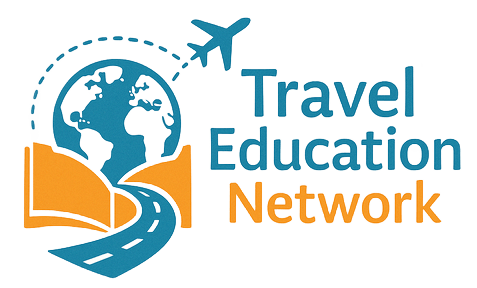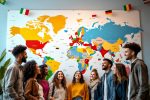From History to Language Learning: The Importance of Travel to Education
Want to transform your education? Discover how travel can boost your skills, broaden your horizons, and connect you with the world. From language learning and cultural immersion to historical exploration and personal growth, travel offers invaluable educational benefits. Explore how enriching experiences abroad can enhance your understanding, foster adaptability, and prepare you for success in our interconnected world. Start your educational journey today!
Important information

- Travel builds crucial life skills: It fosters independence, adaptability, and problem-solving abilities, useful in personal and professional life.
- Cultural immersion: Experiencing diverse cultures firsthand promotes empathy, respect, and a deeper understanding of the world, preparing students for global citizenship.
- Enriched learning: Travel connects classroom knowledge with real-world experiences, making learning more engaging and impactful. Visiting historical sites and interacting with different cultures brings lessons to life.
- Language acquisition: Immersing oneself in a new language environment accelerates learning, improves fluency, and provides authentic opportunities for communication.
- Personal growth: Travel broadens perspectives, challenges preconceived notions, and encourages personal development beyond the classroom.
The Role of Travel in Education
Travel is a powerful educator, subtly shaping character and fostering personal growth. Beyond the classroom, students gain practical skills, independence, and a sense of responsibility. Transforming them into global citizens, travel exposes students to diverse perspectives and experiences, cultivating understanding and respect for other cultures. This prepares them for our interconnected world. Furthermore, these experiences build resilience, enhancing adaptability and interpersonal skills crucial for both personal and professional success.
Subconscious Learning and Skill Development
Traveling offers surprising educational benefits. Students gain practical experience, learning by immersion in new cultures and environments. This hands-on approach fosters essential life skills, such as time management and organization. Exploring unfamiliar places also sharpens problem-solving abilities and adaptability. Moreover, travel exposes students to diverse perspectives, broadening their understanding of the world and promoting cultural sensitivity. These valuable skills complement and enhance classroom learning, making travel a truly enriching educational experience.
Character Building and Becoming World Citizens
Travel fosters adaptability and resilience, pushing you toward independence as you navigate unfamiliar environments and solve problems resourcefully. Students cultivate empathy and respect for different cultures, evolving into global citizens. These enriching experiences broaden perspectives and challenge preconceived notions, ultimately fostering greater tolerance and understanding.
Experiencing Different Cultures for Respect and Understanding
Experiencing different cultures firsthand fosters respect and understanding for diverse perspectives. This direct interaction challenges preconceived notions, cultivates empathy, and promotes adaptability and open-mindedness, which are invaluable assets in our interconnected world. These experiences enhance cultural awareness and prepare individuals for global citizenship. For example, studies show that travel broadens students’ perspectives, improving their intercultural sensitivity and communication skills while also building valuable life skills.
The Educational Benefits of Cultural and Historical Exploration
Visiting historical sites and monuments deepens students’ understanding of different eras and architectural styles, instilling in them the importance of preserving cultural heritage. These experiences offer valuable insights into past civilizations and how they’ve shaped our present.
Travel effectively connects history with geography, enriching students’ understanding of both. Exploring ancient ruins or battlefields makes history come alive, while museums further enhance their grasp of the past and its influence on the world’s landscapes. Consider the Colosseum in Rome or the Pyramids of Giza—prime examples of this impact.
Experiencing diverse cultures firsthand fosters global awareness and cross-cultural understanding. Students develop empathy, adaptability, and respect for different traditions. Interacting with local communities and observing their customs broadens students’ perspectives.
Cultural Heritage and Historical Landmarks
Exploring cultural heritage sites significantly enhances a student’s grasp of history. For example, a trip to Manila’s Intramuros provides a window into the Spanish colonial era, with Fort Santiago and San Agustin Church serving as enduring reminders. The National Museum Complex in Manila further enriches this historical narrative.
Europe
The Galileo Museum in Florence illuminates scientific history.
The Royal Greenwich Observatory in London offers comparable insights.
The Einstein Tower in Potsdam provides insights into scientific advancements.
Asia
A trip to Manila’s Intramuros provides a window into the Spanish colonial era.
Fort Santiago and San Agustin Church in Intramuros serve as enduring reminders of the past.
The National Museum Complex in Manila further enriches this historical narrative.
These experiences foster a deeper appreciation for our shared past, connecting students to history in a tangible way.
Historical Understanding and Geography
Traveling to historical sites makes history come alive, solidifying your understanding through firsthand experience. For example, a trip to Gettysburg reveals the immense scope of the Civil War. Similarly, exploring geographical landscapes like the Grand Canyon vividly demonstrates geological processes. Travel connects abstract concepts to tangible experiences, providing real-world context that makes learning more impactful.
Cultural Discovery and Global Awareness
Traveling broadens your horizons, offering firsthand exposure to diverse lifestyles, traditions, and perspectives. This ignites curiosity and deepens your understanding of the world. Direct interaction with different cultures creates a more profound impact than simply reading about them. Moreover, travel challenges preconceived notions, encourages empathy, and fosters adaptability. It also boosts self-confidence as you navigate unfamiliar territories and situations, solve problems, and discover hidden strengths. The memories and experiences gathered during your travels become cherished stories, enriching your life and inspiring future adventures.
Enhancing Education Through Global Perspectives
Travel fosters global citizenship and cross-cultural understanding, allowing students to adapt, develop empathy, and interact with diverse cultures. Experiential learning in real-world settings enhances education by connecting classroom knowledge to practical applications, boosting engagement and deepening understanding. For example, students studying ancient civilizations can experience history firsthand by exploring historical sites. Furthermore, navigating unfamiliar situations while traveling encourages problem-solving skills and resourcefulness. Beyond academics, travel promotes personal growth, broadens perspectives, and fosters independence.
Benefits of Educational Travel
- fosters global citizenship and cross-cultural understanding,
- allows students to adapt, develop empathy, and interact with diverse cultures,
- enhances education by connecting classroom knowledge to practical applications,
- boosts engagement and deepens understanding.
Travel Enhances Personal Development
- encourages problem-solving skills and resourcefulness,
- promotes personal growth,
- broadens perspectives,
- fosters independence.
Global Citizenship and Cross-Cultural Experiences
Global citizenship cultivates intercultural understanding and respect. Travel broadens horizons, and cross-cultural experiences foster empathy. Students become more adaptable and enhance their communication skills. This exposure nurtures a wider worldview and a deeper understanding of global interconnectedness, promoting a sense of responsibility. These invaluable experiences are essential in preparing students for today’s interconnected world.
Experiential Learning and Real-World Scenarios
Travel transforms classroom learning into dynamic real-world experiences, allowing students to apply their knowledge in exciting new ways. This strengthens critical thinking and problem-solving skills as they navigate unpredictable challenges. For example, using public transport in a foreign country tests their adaptability, while communicating in another language stretches their resourcefulness. These experiences foster educational growth, transforming learning from textbooks and lectures into a vibrant, personal journey.
The Impact of Travel on Language Learning
Immersing yourself in a new culture accelerates language acquisition. Interacting with native speakers provides invaluable opportunities to practice, significantly boosting fluency and comprehension beyond what classroom learning can offer.
Traveling fosters genuine communication, exposing you to new vocabulary and colloquialisms. Navigating everyday situations like ordering food or asking for directions reinforces learning and builds confidence. These real-world interactions naturally enhance fluency.
Experiencing a language firsthand is often inspiring, motivating continued study upon returning home. The practical benefits extend beyond language acquisition, offering cultural insights and a deeper appreciation for the language itself. This newfound motivation can lead to significant improvement in your language skills.
Immersion in Language Through Travel
Immersing yourself in a new language through travel dramatically accelerates learning.
Talking with native speakers provides authentic practice, improving fluency and comprehension naturally.
Daily interactions boost vocabulary and offer invaluable exposure to slang and contextual understanding.
Experiences abroad inspire further study and deepen cultural understanding.
Beyond vocabulary, travel hones pronunciation and conversation skills, giving you a nuanced appreciation for the culture.
Authentic Bilingual Conversation and New Vocabulary
Traveling offers invaluable opportunities for real-world bilingual conversations. These exchanges not only expand your vocabulary but also significantly enhance fluency, allowing learners to apply their skills practically. Such immersive experiences accelerate the learning process. For instance, ordering a meal or requesting directions transforms into a mini-language lesson. Moreover, travel fosters confidence in using the language. The key is to actively pursue these opportunities and overcome any hesitation to speak.
Encouraging Foreign Language Study
Traveling provides authentic opportunities to use a new language, boosting motivation and accelerating learning through immersion. Conversing with native speakers sharpens practical skills, reinforcing classroom studies. These real-world interactions make learning more stimulating, transforming everyday tasks like ordering a meal or asking for directions into valuable lessons. While travel offers invaluable opportunities for practical language use, dedicated study remains essential for building a strong grammatical foundation and expanding vocabulary.
Practical Aspects of Educational Travel
Educational travel unlocks a world of learning opportunities, from enriching school trips to immersive study abroad programs. These experiences offer hands-on learning and cultural immersion, fostering a deeper understanding of the world. Students develop valuable life skills like independence and adaptability. Moreover, such travel enhances classroom learning by bringing lessons to life. Imagine a history class exploring ancient ruins; suddenly, the past becomes tangible and engaging. Successful educational trips require meticulous planning, including logistics and budgeting. Consider these key aspects for a rewarding educational travel experience:
Benefits of Educational Travel
- Hands-on learning: experiencing subjects firsthand, making learning more engaging and memorable.
- Cultural immersion: gaining a deeper understanding of different cultures, broadening perspectives, and promoting tolerance.
- Life skills development: fostering independence, adaptability, problem-solving skills, and cross-cultural communication.
- Enhanced classroom learning: bringing lessons to life and making abstract concepts more concrete.
Planning for Educational Travel
- Logistics: arranging transportation, accommodation, and activities efficiently to ensure a smooth and safe trip.
- Budgeting: developing a realistic budget that covers all expenses, from flights and visas to meals and excursions.
- Safety and security: implementing measures to ensure the safety and well-being of students throughout the trip.
Travel Planning and Educational Tours
Planning an educational tour involves several key steps.
Define your destination and educational purpose. Clearly establish where you’re going and the learning objectives you aim to achieve.
Conduct thorough research, focusing on safety. Consult travel advisories and learn about local customs and regulations.
Liaise with the host institution. Contact them for guidance and support in planning your activities.
Create a detailed itinerary. Outline all activities, transportation, accommodation, and logistical arrangements.
Establish a comprehensive budget. Factor in all expenses, including travel, accommodation, activities, and meals.
Consider your timeframe and quarantine restrictions. Determine the duration of your tour and account for any potential quarantine requirements upon arrival or return.
With careful preparation, your educational tour will be a success.
School Trips and Study Abroad Programs
School trips and study abroad programs offer invaluable cultural and historical lessons, providing students with firsthand experiences that foster independence and adaptability. These enriching opportunities enhance global awareness and encourage respect for diverse perspectives. Experiences beyond the classroom contribute significantly to personal growth and enrich academic learning, ultimately shaping informed, globally engaged citizens. Here are some key benefits of these programs:
- Cultural immersion: experiencing new cultures firsthand promotes understanding and appreciation of different traditions and values.
- Historical exploration: visiting historical sites brings history to life, making learning more engaging and memorable.
- Personal development: navigating unfamiliar environments fosters independence, adaptability, and problem-solving skills.
- Global awareness: exposure to diverse perspectives broadens students’ understanding of global issues and interconnectedness.
- Enhanced learning: these experiences complement classroom learning, making education more holistic and relevant.

















